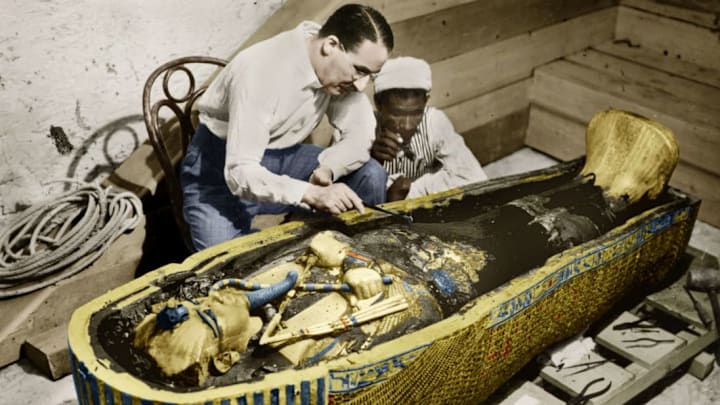On November 4, 1922, a team of researchers led by British archaeologist Howard Carter discovered a step that marked the entrance to King Tutankhamen's tomb. When King Tut's tomb itself was unearthed on November 26, 1922—after more than 3000 years of uninterrupted repose—some believed the pharaoh unleashed a powerful curse of death and destruction upon all who dared to disturb his eternal slumber.
Like any urban legend or media sensation, the alleged "curse of the pharaohs" grew to epic proportions over the years. Here are nine people who might make you believe in such things, and one who should have been a direct recipient of Tut's wrath 100 years ago.
1. George Herbert, 5th Earl of Carnarvon
The man who financed the excavation of King Tut's tomb was the first to succumb to the supposed curse. Lord Carnarvon accidentally tore open a mosquito bite while shaving and ended up dying of blood poisoning shortly thereafter. This occurred a few months after the tomb was opened and a mere six weeks after the press started reporting on the "mummy's curse," which was thought to afflict anyone associated with disturbing the mummy. Legend has it that when Lord Carnarvon died, all the lights in his house—or, according to some accounts, all the lights in Cairo—mysteriously went out.
2. Sir Bruce Ingham
Howard Carter, the archaeologist who discovered the tomb, gave a paperweight to his friend Bruce Ingham as a gift. The paperweight appropriately (or perhaps quite inappropriately) consisted of a mummified hand wearing a bracelet that was supposedly inscribed with the phrase, "cursed be he who moves my body." Ingham did not die from the mummy's curse, though his house burned to the ground not long after receiving the gift. When he tried to rebuild, it was hit with a flood.
3. George Jay Gould
George Jay Gould was a wealthy American financier and railroad executive who visited the tomb of Tutankhamen in 1923 and fell sick almost immediately afterward. He never really recovered and died of pneumonia a few months later.
4. Aubrey Herbert
It's said that Lord Carnarvon's half-brother suffered from King Tut's curse simply by being related to the amateur Egyptologist. Aubrey Herbert was born with a degenerative eye condition and became totally blind late in life. A doctor suggested his rotten, infected teeth were somehow interfering with his vision, so Herbert had every single tooth pulled from his head in an effort to regain his sight. It didn't work. He did, however, die of sepsis as a result of the dental surgery, just five months after the death of his supposedly cursed brother.
5. Hugh Evelyn-White

Hugh Evelyn-White, a British archaeologist, visited King Tut's tomb and may have helped excavate the site. By 1924, after seeing death sweep over about two dozen of his fellow excavators, Evelyn-White died by suicide—but not before writing, allegedly in his own blood, "I have succumbed to a curse which forces me to disappear."
6. Aaron Ember
American Egyptologist Aaron Ember was friends with many of the people who were present when King Tut's tomb was opened, including Lord Carnarvon. Ember died in 1926, when his house in Baltimore burned down less than an hour after he and his wife hosted a dinner party. He could have exited safely, but his wife encouraged him to save a manuscript he had been working on while she fetched their son. Sadly, they and the family's maid died in the catastrophe. The name of Ember's manuscript? The Egyptian Book of the Dead.
7. Richard Bethell
Bethell was Lord Carnarvon's secretary and the first person behind Carter to enter the tomb. He died in 1929 under suspicious circumstances—though one modern historian has attributed his death to the work of infamous occultist Aleister Crowley. Bethell was found smothered in his room at an elite London gentlemen's club. Soon after, the Nottingham Evening Post mused, "The suggestion that the Hon. Richard Bethell had come under the ‘curse’ was raised last year, when there was a series of mysterious fires at [his] home, where some of the priceless finds from Tutankhamen’s tomb were stored." No evidence of a connection between artifacts and Bethell's death was established, though.
8. Sir Archibald Douglas Reid
Proving that you didn't have to be one of the excavators or expedition backers to fall victim to Tutankhamun's curse, Sir Archibald Douglas Reid, a radiologist, merely X-rayed Tut before the mummy was given to museum authorities. He got sick the next day and was dead three days later.
9. James Henry Breasted
James Henry Breasted, another famous Egyptologist of the day, was a member of Carter's team when King Tut's tomb was opened. Shortly thereafter, he allegedly returned home to find that his pet canary had been eaten by a cobra—and the cobra was still occupying the cage. Since the cobra is a symbol of the Egyptian monarchy, and a motif that kings wore on their headdresses to represent protection, this was a rather ominous sign. Breasted himself didn't die until 1935, although his death did occur immediately after a trip to Egypt.
10. Howard Carter
Carter never had a mysterious, inexplicable illness and his house never fell victim to any fiery disasters. He died of lymphoma at the age of 64. His tombstone even says, "May your spirit live, may you spend millions of years, you who love Thebes, sitting with your face to the north wind, your eyes beholding happiness." Perhaps the pharaohs saw fit to spare him from their curse.
A version of this story originally ran in 2018; it has been updated for 2022.
